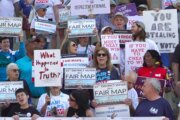CHRISTOPHER TORCHIA
Associated Press
PRETORIA, South Africa (AP) — South Africa’s ruling African National Congress was headed for a comfortable win as vote-counting in South Africa’s elections drew to a close Friday while key opposition rivals strengthened their support after promising change after 20 years of leadership by the party that led the fight against apartheid.
With nearly 99 percent of South Africa’s voting districts counted, the African National Congress had 62.2 percent of the vote, a few percentage points lower than its result in 2009 elections, according to the national election commission.
The main opposition group, the Democratic Alliance, had 22.2 percent, up more than 5 percent since the last election; and the Economic Freedom Fighters, a new party that wants to distribute wealth to the poor, had 6.3 percent.
Final results will be announced on Saturday, said the election commission.
Voting turnout was 73 percent of the 25 million South Africans, or half the population, who registered for the national and provincial elections held on Wednesday. Under South Africa’s proportional representation system, the 400 seats in the National Assembly will be allocated to parties based on how many votes they received nationwide.
Once led by Nelson Mandela, the African National Congress campaigned on a record of promoting democratic freedoms and providing basic services to millions of South Africans since the end of white minority rule in 1994. Its reputation has been tarnished by the 2012 killing of several dozen protesters by police during labor unrest, which recalled the violent excesses of the apartheid era, and a scandal involving more than $20 million in state spending on the private home of President Jacob Zuma.
Still, the party’s relatively solid showing reflected the resilience of its support despite a series of scandals, and its ability to fend off a spirited challenge from the Democratic Alliance, a party with roots in white liberal opposition to apartheid decades ago that has sought to expand its influence beyond its stronghold in the Western Cape, one of South Africa’s nine provinces.
The Democratic Alliance, which has centrist policies and campaigned on a platform of more jobs and curbs on corruption, is looking to build on its gains in urban areas ahead of municipal elections in 2016, with cities such as Johannesburg poised to be campaign battlegrounds.
As a new player in parliament, the Economic Freedom Fighters is likely to be a vocal critic of the African National Congress, which has shunned calls for a radical transformation of the economy despite government complaints that much of the economy remains in the hands of white South Africans, a legacy of official discrimination under apartheid. The party is led by Julius Malema, an expelled head of the ruling party’s youth league.
Opposition groups that performed poorly included Agang, a new party led by Mamphela Ramphele, who was the partner of Steve Biko, the Black Consciousness leader who was tortured and died in police custody in 1977. Ramphele has been an activist, doctor, academic and World Bank executive.
Another loser was the Congress of the People, which broke away from the ruling party and did far better in the 2009 vote. Its leader, Terror Lekota, had promised to “eat a hat” if his party won fewer votes this year. On Friday, he sank his teeth into a hat in front of election officials and journalists, but did not eat it.
Copyright 2014 The Associated Press. All rights reserved. This material may not be published, broadcast, rewritten or redistributed.







